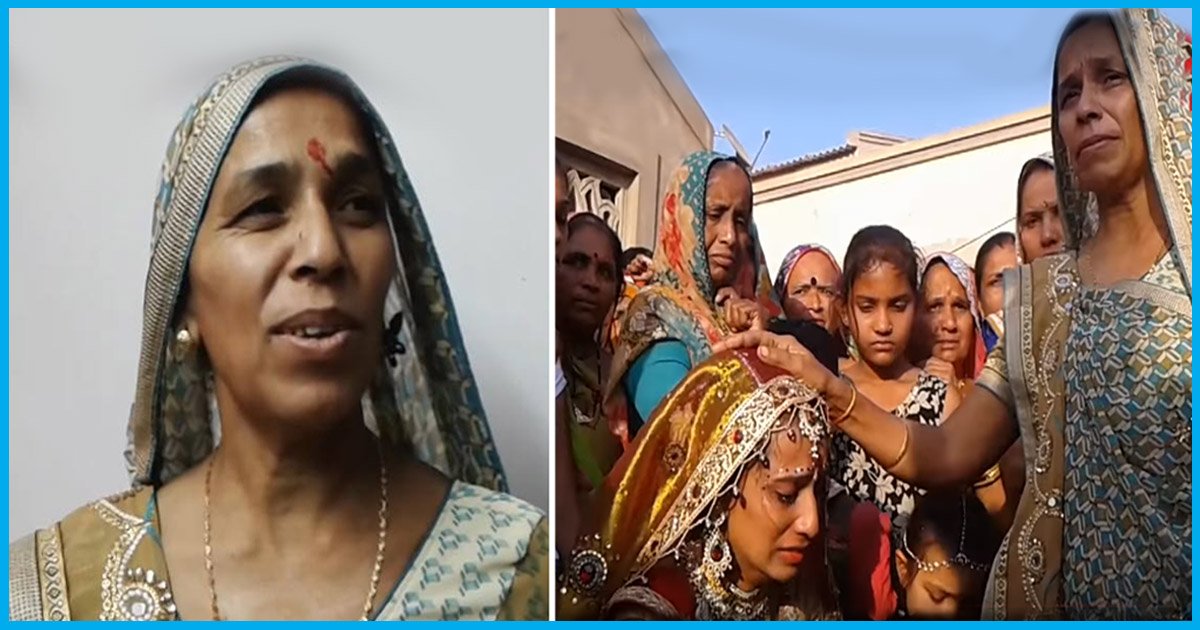
Barred Form Her Children's Marriage Three Times, A Widow Broke The Taboo The Fourth Time
21 April 2017 6:46 AM GMT
A wedding in the family is one of the happiest events. Imagine being barred from your own daughter’s wedding. This is exactly what happened with Daniben Makwana. Fifty-year-old Daniben had raised four children on her own after her husband’s death. But she could not participate in the marriage rituals of her three children. Why? People thought she would bring bad luck because she is a widow. Among the multitude of restrictions placed on a Hindu widow, one is that she cannot participate in any auspicious event or rituals in her family.
Dani ben broke this taboo against widows when she finally took part in her youngest daughter’s wedding. She was the one to greet the groom when he came into the home on the wedding day. A visibly nervous Daniben placed a tika on his forehead, accepting him as the new son-in-law.
How was such a change a possible, in the most traditional and important of Indian traditions, the marriage ceremony?
It happened because of Dani ben, despite her own misgivings, had the staunch support of the women in her community and family. They all came together to challenge the unfairness inherent in a custom that barred a mother from her own daughter’s wedding, only because her husband is dead.
All these women are part of a Gender Discussion Club run by Video Volunteers’ Community Correspondent Yashodhara Salve, in the town of Dhrangadhra in Gujarat. Yashodhara regularly screens films on patriarchy and gender discrimination made by Community Correspondents from across sixteen states in India. These films often point out how concepts like ‘tradition’ and ‘culture’ are used as an excuse to oppress women. One such film showed a group of women from Uttar Pradesh discussing the societal compulsion to practice purdah (veiling) and how inconvenient and unfair this practice is for women. At the end of the film, Yashodhara encouraged the women in her group to discuss similar oppressive practices they are subjected to.
Encouraged by Yashodhara’s questions, the women started talking about how badly widows are treated in their community. Vali ben talked about her sister-in-law Dani ben, and how sad it was that she couldn’t participate in the ceremonies and rituals in her daughter’s wedding. She added that if the rest of the women supported her, she would ensure that Daniben participates in her youngest daughter’s wedding. All the other women pledged their support and Yashodhara promised to film it. As one of them firmly asserted, “If anyone criticises us, we’ll fight for her right. She gave birth to the children, so it is her right.”
Dani ben herself was more unsure. She didn’t want her participation to mar the ceremony and anger her family or relatives. But the women’s relentless support and encouragement, all captured by Yashodhara on her camera, finally persuaded her. The way the women in the Gender Discussion Club came together for Daniben show how easily an entrenched institution like patriarchy crumbles once people refuse to uphold its oppressive edicts. All that was needed was an impetus to start reflecting and space to enable open discussions.
Yashodhara, for her part, is proud that her Discussion Club provided the space to start such conversations. Yashodhara herself was not always the outspoken filmmaker she is today. She came from a family where women were expected to stay at home, not question the male decision makers and get married. She recalls, that from her childhood onward she had the habit of questioning all sorts of restrictions imposed on her because she was a girl. As a child, she loved wearing pants and was once publicly humiliated by her uncle who said young girls are not supposed to wear such clothes.
Since that time her greatest ally has been her courage to ask “why?”. She says “I still ask that question when people try to tell me the way women should ‘behave’. It almost always puts an end to that argument.”
The camera had become a tool to further this questioning. By eighteen Yashodhara was a community filmmaker, bringing change through the films she made. She says,”At first, the community was amused and wondered what girls with a camera can do. But our films became a mirror of their lives, our screenings became bigger and we grew more confident while speaking to the community. There was a visible change in the way our community perceived us. They saw and believed that I was better than the boys. I was proud of myself.”
The Logical Indian community appreciates the courage of Daniben Makwana and hopes that many women get inspired and break the taboo around widow women.
Article by: Madhura Chakraborty.
This video compilation is a part of Video Volunteers gender campaign #KhelBadal – Dismantle Patriarchy. The campaign is taking on patriarchy through stories of women and men who face, negotiate and challenge patriarchy in everyday life — at home, at work, at school, in cultural and public spaces. Know more here.
 All section
All section













